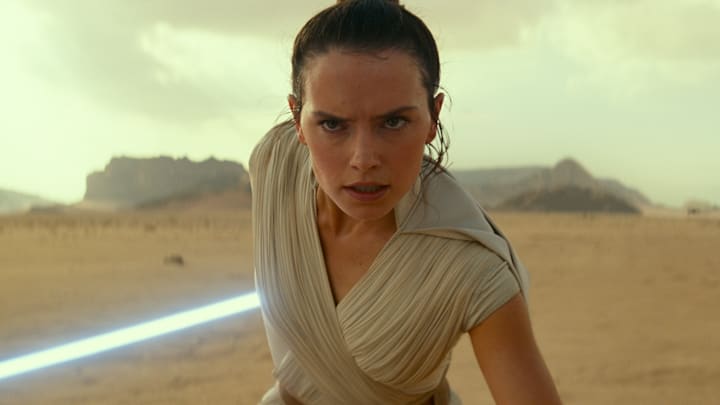The Star Wars sequel movies received a very divisive response from the fans, especially after Rey's identity was changed in the third movie.
The character, played by Daisy Ridley, started as a nobody in The Force Awakens, where her origin story was kept a secret. In the second movie, The Last Jedi, it was declared that she truly had no legacy in the lore of the franchise and no ties to any existing characters. However, The Rise of the Skywalker did a 180-degree turn on Rey's parentage, and she was declared to be the granddaughter of Emperor Palpatine.
The twist came as a shock to many and further polarized the reactions to the series. The retcon completely dismissed the original message that anyone can be a hero - a Jedi - regardless of their roots or ancestry. In a way, it perhaps sought to battle the elitist, conservative ideologies that the Jedi Order reeked of before it fell apart. Had Rey stayed a nobody and yet surpassed all obstacles in her way to become a powerful Jedi and take down the First Order, it could have, with some more effort, drawn a full circle back to the Skywalker saga. Anakin Skywalker, after all, was the son of a slave on Tatooine.
None of that mattered as Rey fought her final battle as a Palpatine. She accepted her lineage but rejected what it stood for, ironically taking away from the character's growth through hard work and determination. The change meant that she would always end up with this fate, one way or the other, as it was destined for her before she was even born.
It was somewhat worsened by Rey taking on the honorary title of a Skywalker at the end of the movie.
While Daisy Ridley has not been quite as vocal as John Boyega in criticizing the sequels, it is evident from her many interviews that the change was not entirely to her liking. Speaking with Rolling Stone last year, she stated that while she liked both versions of Rey's origin story, she did not have much say in how her character would evolve:
"Well, J.J. [Abrams] was the one who was like, she is of no one, so it wasn’t just The Last Jedi where that was the message. What was interesting about the last one, for me, was that you can be a hero and not come from anywhere or you can be a hero and come from literally the worst person in the universe. You’re not your parents, you’re not your grandparents, you’re not your bloodline, and you’re not the generations before you. So, I always was like, sure. But it’s beyond my pay grade. I say the words, do the thing. I do love the version of you can be anyone you want to be, but I also love the version where you can rectify wrongs and can’t help what you’re born into."Daisy Ridley, Rolling Stone
On the latest episode of Josh Horowitz's Happy Sad Confused podcast, Ridley talked about being at the receiving end of fan backlash for Star Wars while promoting her latest indie film, Sometimes I Think About Dying,
"It's still upsetting. You don't want people to feel like you've not served the thing they're a fan of," Ridley said.
Daisy Ridley deserved better from the fans
While the fans were well within their rights to criticize the storytelling, it was in poor taste to spew vitriol at Ridley and other actors for how the trilogy ended. Actors, as we all know, have little to no hand in the writing or direction of a movie, especially if they are just starting out in the industry. At 23 years of age, Star Wars was one of Ridley's earliest works in Hollywood. She did her best with the script she was given.
In a recent conversation with Variety, Ridley recollected what it was like being the youngest actor on set. "It took me the first two Star Wars films to feel worthy of being there." She did not feel too differently even after the first movie's release. "After the screening of the first film, I told myself that I was sh*t and that I was really worthless. I cried my eyes out thinking I was the worst thing that ever happened to Star Wars," she told Clique earlier this month.
Some criticisms of Ridley (and subsequently of her character) were solely centered around the fact that she was a new face, a woman at that, who got to be a Jedi and call herself a Skywalker by the end.
However, the responsibility of delivering strong characters and good storylines falls much more on the writers, directors, and producers than the actors. You don't always need references spanning across multiple movies to make the audience connect with a character. Gareth Edwards' Rogue One: A Star Wars Story is a shining example of that.
Ridley is set to reprise the role of Rey in a new Star Wars movie directed by Sharmeen Obaid-Chinoy of Ms. Marvel fame. She told Horowitz that prior to her meeting with Lucasfilm president Kathleen Kennedy to discuss the new project, she noticed that the sentiment around The Rise of the Skywalker was now "different than it had been before," which she found strange.
Could Ridley's new movie change the narrative around the prequels the same way The Clone Wars and Star Wars Rebels helped redeem the prequels? Would there be a moment down the line when Ridley gets her due after years of rejection by Star Wars fans, similar to Hayden Christensen? Only time will tell.
